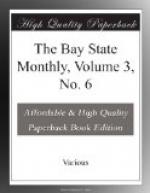“It is well known,” he said, “that acting as governor of the Province, you are by its charter the commander-in-chief of the military forces within it; and as such, the troops now in the capital are subject to your orders. If you, or Colonel Dalrymple under you, have the power to remove one regiment, you have the power to remove both; and nothing short of their total removal will satisfy the people or preserve the peace of the Province. A Multitude highly incensed now wait the result of this application. The voice of ten thousand freemen demands that both regiments be forthwith removed. Their voice must be respected, their demand obeyed. Fail not then at your peril to comply with this requisition! On you alone rests the responsibility of this decision; and if the just expectations of the people are disappointed, you must be answerable to God and your country for the fatal consequences that must ensue. The committee have discharged their duty, and it is for you to discharge yours. They wait your final determination.”
Hutchinson for a long time stood firm, but yielded at last and the troops were removed.
It is not the purpose of this paper to follow Samuel Adams through his active career in the years of the Revolution and the succeeding period. It is always Samuel Adams, the unswerving patriot, the adroit leader, the man of the people. It had long been felt in England that his was the most active spirit in the cause of the patriots, and there was much talk of effecting his arrest and bringing him to trial on the charge of treason, but the move was never made. Adams’ courage never failed. He had long given up the idea of any compromise between the colonies and the Crown, and there is nothing conciliatory in his words or acts. When the tea was emptied into Boston Harbor it was easily understood that Adams was the real leader in the action. No one familiar with the life of the great town meeting man, as Prof. Hosmer likes to call him, can doubt that he had the essential qualities of an adroit strategist. Cromwell once locked Parliament out, Adams once locked the Assembly in. He had secured a majority of the members to vote for a Continental Congress, but could the resolve be presented and brought to a final vote before Governor Gage could prorogue the Assembly, as he would use all speed to do, the instant the first knowledge of the scheme reached his ears? On the 17th of June, just one year before the Battle of Bunker Hill, that question was answered. The resolve was offered that day providing for the appointment of delegates to such a congress. Tory members at once essayed to leave the hall to dispatch the news to the governor, but the bolts were fast, and Samuel Adams had the key in his pocket. Two months later the delegates were on their way to Philadelphia,—Thomas Cushing, Samuel and John Adams and Robert Treat Paine.




